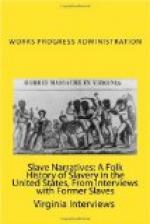Amanda was trained to be a house servant, learning to cook and knit from the blind mother who refused to let this handicap affect her usefulness. She liked best to sew the fine muslins and silks of her mistress, making beautiful hooped dresses that required eight and ten yards of cloth and sometimes as many as seven petticoats to enhance their fullness.
Hoops for these dresses were made of grape-vines that were shaped while green and cured in the sun before using. Beautiful imported laces were used to trim the petticoats and pantaloons of the wealthy.
The Pamell slaves had a Negro minister who could hold services any time he chose, so long as he did not interfere with the work of the other slaves. He was not obliged to do hard menial labors and went about the plantation “all dressed up” in a frock coat and store-bought shoes. He was more than a little conscious of this and was held in awe by the others. He often visited neighboring plantations to hold his services. It was from this minister that they first heard of the Civil War. He held whispered prayers for the success of the Union soldiers, not because freedom was so desirable to them, but for other slaves who were treated so cruelly. There was a praying ground where “the grass never had a chancet ter grow fer the troubled knees that kept it crushed down.”
Amanda was an exceptionally good cook and so widespread was this knowledge that the Union soldiers employed her as a cook in their camp for a short while. She does not remember any of their officers and thinks they were no better nor worse than the others. These soldiers committed no depredations in her section except to confiscate whatever they wanted in the way of food and clothing. Some married southern girls.
Mr. Pamell made land grants to all slaves who wanted to remain with him; few left, so kind had he been to them all.
Life went on in much the same manner for Amanda’s family except that the children attended school where a white teacher instructed them from a “blue back Webster.” Amanda was a young woman but she managed to learn to read a little. Later they had colored teachers who followed much the same routine as the whites had. They were held in awe by the other Negroes and every little girl yearned to be a teacher, as this was about the only professional field open to Negro women at that time.
“After de war Negroes blossomed out with fine phaetons (buggies) and ceiled houses, and clothes—oh my!”
Mrs. McCray did not keep up with the politics of her time but remembers hearing about Joe Gibbs, member of the Florida Legislature. There was much talk then of Booker T. Washington, and many thought him a fool for trying to start a school in Alabama for Negroes. She recalls the Negro post master who served two or three terms at Madison. She could not give his name.
There have been three widespread “panics” (depressions) during her lifetime but Mrs. McCray thinks this is the worst one. During the Civil War, coffee was so dear that meal was parched and used as a substitute but now, she remarked, “you can’t hardly git the meal for the bread.”




